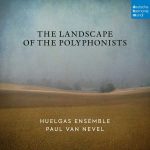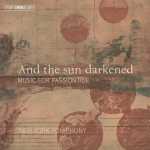

Composer: Antoine Brumel, Loyset Compère, Josquin Despres, Antoine de Févin, Heinrich Isaac, Jean Lhéritier, Jean Mouton, Johannes Ockeghem, Pierre de la Rue, Adrian Willaert
Performer: The Gesualdo Six
Conductor: Owain Park
Format: FLAC (tracks)
Label: Hyperion
Catalogue: CDA68379
Release: 2021
Size: 1.21 GB
Recovery: +3%
Scan: yes
Ockeghem: Intemerata Dei mater
01. I. Intemerata Dei mater
02. II. Nec sine te manet
03. III. Aspiciat facito
Josquin: Nymphes Des Bois
04. I. Nymphes des bois
05. II. Acoutrez vous
06. III. Requiescat in pace
Compère: Quis numerare queat
07. I. Quis numerare queat
08. II. Audivit ipse
09. III. Fundant preces
10. Brumel: Tous les regretz quelques furent au monde
11. Rue: Absalon fili mi
Josquin: Illibata Dei Virgo Nutrix
12. I. Illibata Dei virgo nutrix
13. II. Ave virginum decus hominum
14. III. Ave Maria, mater virtutum
Févin: Nesciens mater
15. I. Nesciens mater
16. II. Virgo hodie
17. Mouton: Qui ne regrettoit
Willaert: Infelix ego
18. I. Infelix ego
19. II. Ad te igitur
Isaac: Esto mihi
20. I. Esto mihi
21. II. In te, Domine, speravi
Josquin: Virgo prudentissima
22. I. O virgo prudentissima
23. II. Audi virgo puerpera
Josquin: Tu solus qui facis mirabilia
24. I. Tu solus qui facis mirabilia
25. II. Ad te solum confugimus
26. III. Ad te preces effundimus
27. IV. D’ung aultre amer
28. V. Audi nostra suspiria
Lhéritier: Miserere mei, Domine
29. I. Miserere mei, Domine
30. II. Ne proiicias me
Josquin’s sublime, brief tribute to the memory of Ockeghem—‘Nymphes des bois’—is the emotional core of a programme which explores Josquin’s own influence on some of the great names of his time.
The Gesualdo Six and director Owain Park (also the group’s bass) have expanded their mission quite a bit beyond performances of music by their namesake, recording Renaissance polyphony from various countries. Their precise, close-up sound is instantly appealing and arguably more emotionally involving than the classic cathedral choir recordings of repertory like that on this 2021 release. A specific aspect of Josquin’s legacy is explored here: music of the composers who worked after Josquin at the court of the Este family in Ferrara. The program begins with a motet by Ockeghem, possibly Josquin’s teacher, and the inspiration for Josquin’s magnificent ode Nymphes des bois, memorializing Ockeghem. The text for that piece mentions several other composers whom Ockeghem influenced that are included here, and they’re both unfamiliar and of high quality. Consider the serene setting of Infelix ego of Adrian Willaert. There are also some big motets by Josquin himself. Listeners have to accept the idea of one-voice-per-part performance when the norm was probably more, but even those favoring a choral approach will admit that in the minimal textures of Josquin’s Tu solus qui facis mirabilia, the clean, sharp sound of The Gesualdo Six is marvelously effective. Hyperion’s sound from All Hallows Church, Gospel Oak, London, is excellent, and this may well be an album that will draw new listeners to the repertory of the early 16th century.



